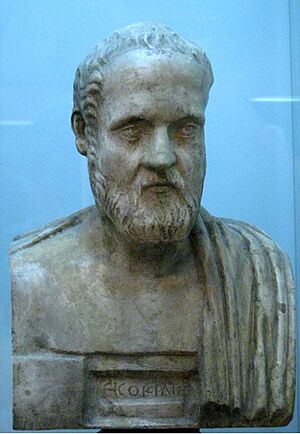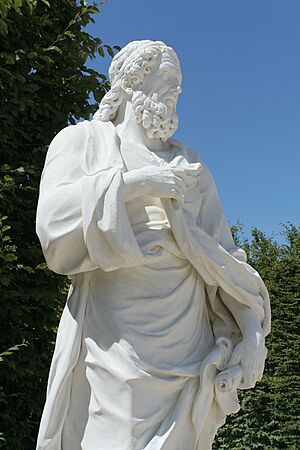Isocrates facts for kids
Isocrates (born 436 BC, died 338 BC) was a very famous ancient Greek speaker and teacher. He was one of the ten best speakers from the region of Attica. Isocrates greatly influenced how people thought about speaking and learning through his teaching and his many written works.
The art of public speaking, called rhetoric, started in ancient Greece with a man named Corax. His student, Tisias, helped develop speaking for courtrooms. Isocrates might have been Tisias's student. Over time, public speaking became very important, especially as democracy and courts grew in Greece. Isocrates lived to be almost 100 years old.
Contents
Early Life and Learning
Isocrates was born into a wealthy family in Athens, Greece. This was when Athens was very powerful, just before a big war called the Peloponnesian War (431–404 BC). His father, Theodorus, owned a workshop that made musical instruments called aulos.
Isocrates received an excellent education. He studied with several important teachers, including Tisias, Prodicus, and Gorgias. He also spent time with Socrates, another famous Greek thinker.
His youth was a difficult time for Athens, especially after the death of Pericles, a great Athenian leader. Money was wasted, and political decisions were often bad and harsh. The Peloponnesian War also caused his family to lose their wealth. Because of this, Isocrates had to find a way to earn a living.
Later in his life, he married a woman named Plathane and adopted her son, Aphareus.
Isocrates' Career
Isocrates stayed out of public life during the difficult years of the Peloponnesian War.
He started his career as a logographer. This means he was a hired speechwriter for people who needed to speak in court. In Athens, citizens had to speak for themselves in legal cases. So, they would hire people like Isocrates to write their speeches. Isocrates was very good at writing, but he didn't like speaking in public himself because he had a weak voice. So, he published his speeches as pamphlets. Even though he didn't take a direct part in politics, his written speeches greatly influenced the public and shared important ideas about the political issues of his time.
Around 392 BC, Isocrates opened his own school for public speaking. At that time, Athens didn't have standard higher education. Teachers, called sophists, usually traveled from place to place. Isocrates became a very influential teacher and a smart businessman. He charged high fees and usually taught no more than nine students at a time. Many of his students became famous philosophers, lawmakers, historians, speakers, writers, and leaders. Because of this, he became very wealthy.
His teaching focused on the idea of arete (which means "virtue" or "excellence"). He believed people could achieve this by studying philosophia. For Isocrates, philosophia wasn't just about deep, abstract ideas like Plato taught. Instead, it was about studying and using ethics (right and wrong), politics, and public speaking in real life.
His Teaching Style
Isocrates believed that public speaking was more than just expressing thoughts. He saw it as a way to use reason, feeling, and imagination. He thought it helped us persuade ourselves and others, and also helped guide public affairs. Isocrates said that public speaking was "that gift of our human nature which makes us more than animals and allows us to live a civilized life."
He clearly explained his teaching style in a speech called "Against the Sophists." He wrote this to explain the ideas behind his new school. He promoted a broad education and disagreed with two types of teachers:
- The Eristics, who argued about theories and ethics.
- The Sophists, who taught political debate tricks.
Isocrates called his own study philosophia, not just rhetoric. He wanted to show how his teaching was different from the bad practices of some Sophists.
Isocrates's teaching focused on using language to solve real-world problems. He stressed that students needed three things to learn well: 1. A natural talent, which they were born with. 2. Knowledge and training from teachers and books. 3. Practice, designed by educators.
He also emphasized civic education, which meant training students to serve their city or state. Students would practice writing and giving speeches on different topics. He thought natural ability and practice were more important than strict rules for speaking. Instead of fixed rules, Isocrates taught "fitness for the occasion," or kairos. This meant a speaker's ability to change and adapt to different situations. His school lasted for over 50 years and helped create the core of what we now call liberal arts education, which includes public speaking, writing, history, citizenship, culture, and good behavior.
The First School of Public Speaking
Before Isocrates, teachers called Sophists traveled from town to town. They taught anyone interested in politics how to speak well in public. Famous Sophists of that time included Gorgias and Protagoras.
Around 392-390 BC, Isocrates founded his academy in Athens, near the Lyceum. This was known as the first academy specifically for public speaking. His school brought students to Athens to study, whereas before, teachers traveled to students. At first, his students were Athenians. But after he published a famous speech called Panegyricus in 380 BC, his reputation spread throughout Greece.
Later, Plato, who was a rival of Isocrates, founded his own academy as a competing school of philosophy. Isocrates encouraged his students to observe public life in Athens to learn by watching others. His students aimed to learn how to serve their city. Some of his famous students included Isaeus, Lycurgus, Hypereides, and Theopompus. Many of them studied with Isocrates for three to four years. One student, Timotheus, appreciated Isocrates so much that he put up a statue in his honor.
Other Influences
Because Plato often criticized the Sophists, Isocrates's school, which focused on public speaking (a field connected to the Sophists), was sometimes seen as teaching unethical or tricky methods. However, many of Plato's criticisms don't really fit Isocrates's actual work. In fact, in one of his writings, Plato even shows Socrates praising Isocrates.
Isocrates believed an ideal speaker needed not only speaking skills but also a broad knowledge of philosophy, science, and the arts. He promoted Greek ideas like freedom, self-control, and good character. Because of this, he influenced several Roman speakers, such as Cicero and Quintilian. He also shaped the main ideas of liberal arts education.
Isocrates made new improvements in public speaking, paying more attention to how words sounded and flowed than other Greek writers. His sentences were often complex and artistic, though sometimes this made them less clear.
Out of 60 speeches known in Roman times, 21 still exist today. The oldest copies we have are from the 9th or 10th century. However, in the 1990s, older copies of his first three speeches were found in Egypt. We also have nine letters written by him, but some people question if four of them are truly his. He is also said to have written a book called Art of Rhetoric, but no copy of it has been found. Other surviving works include his autobiography, Antidosis, and educational texts like Against the Sophists.
Isocrates wrote a collection of ten known speeches. Three of them were for the rulers of Salamis, a city on the island of Cyprus. In one speech, To Nicocles, Isocrates gave advice on how a new king could rule best. He also advised Nicocles on how to improve himself through education and by studying wise people.
He also wrote a speech for Archidamus, the prince of Sparta. Isocrates believed that settling people from Thebes in Messene was wrong. He was especially concerned that this would make former slaves into masters. Isocrates believed justice was most important for Spartan laws. Ten years later, Isocrates wrote a letter to Archidamus, who was then king of Sparta. He urged him to help the Greeks stop fighting each other so they could end the threats from the Persians.
At the end of the Social War in 355 BC, when Isocrates was 80 years old, he wrote a speech for the Athenian assembly called On the Peace. In this speech, he asked people to listen fairly to both sides. He pointed out that those who favored peace never caused trouble, while those who wanted war often led to disasters. Isocrates criticized people who flattered others and brought ruin to public affairs.
Lasting Influence
Even though Isocrates is sometimes overlooked in the history of philosophy, his contributions to studying and practicing public speaking have received more attention. Many experts believe that because Isocrates influenced Cicero, whose writings on rhetoric were studied for a very long time, Isocrates might be considered one of the most influential Greeks.
Some scholars see Isocrates's work as a step towards Aristotle's more organized ideas about rhetoric. However, other scholars argue that Isocrates offers a different and valuable view. While Aristotle saw rhetoric as a neutral tool, Isocrates believed it was a way to shape who people are and to strengthen their identity as citizens. Isocrates's ideas about rhetoric are similar to those of a 20th-century thinker named Kenneth Burke, who said that rhetoric is about finding common ground and connecting with others. Isocrates's work has also been described as an early form of Pragmatism, because he believed that public speaking uses practical knowledge to solve real problems in the world.
See also
 In Spanish: Isócrates para niños
In Spanish: Isócrates para niños
- Anaximenes of Lampsacus
- Paideia
- Papyrus Oxyrhynchus 27
- Protrepticus (Aristotle)
 | Bessie Coleman |
 | Spann Watson |
 | Jill E. Brown |
 | Sherman W. White |



